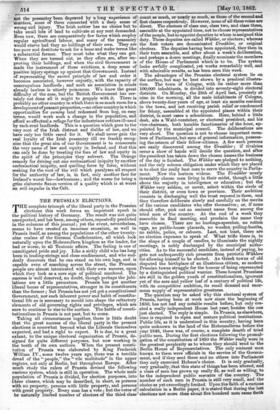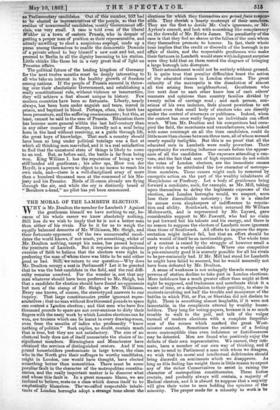THE PRUSSIAN ELECTIONS.
THE complete triumph of the liberal party in the Prussian elections this week forms an important epoch in the political history of Germany. The result was not quite unexpected, and has been, among others, repeatedly predicted in the columns of this journal ; yet the event, nevertheless, seems to have created an immense sensation, as well in Prussia itself, as among the populations of the other twenty- nine realms of the German Confederation, all which look naturally upon the Hohenzollern kingdom as the leader, for bad or worse, in all Teutonic affairs. The feeling is one of unmitigated pride and joy. Like a sickly child who has long been in leading-strings and close confinement, and who sud- denly discovers that he can stand on his own legs, and is capable even of marching across the street, the Prussian people are almost intoxicated with their own success, upon which they look as a sure sign of political manhood. The success is well deserved, no doubt, though perhaps the jubi- lations are a little premature. Prussia has got another liberal house of representatives, stronger in its constituents than the former ; but Prussia has not yet got a constitutional Government, nor such inherent power and habit of constitu- tional life as is necessary to mould into shape the refractory elements of old governing rights and privileges, which are sure to continue to rise to the surface. The battle of consti- tutionalism in Prussia is not past, but to come. Taking all circumstances together, there is little doubt that the great success of the liberal party in the present elections is somewhat beyond what the Liberals themselves expected, and had a right to expect. It is due, to a great extent, to the unique electoral organization of Prussia, de- signed for quite different purposes, but now working in the teeth of its own authors. When the present consti- tution of Prussia was elaborated by King Frederick William IV., some twelve years ago, there was a terrible dread of the " people," the " vile multitude" in the upper regions, not only at Berlin, but throughout Europe. After much study the rulers of Prussia devised the following curious system, which is still in operation. The whole male population of Prussia is divided, for election purposes, into three classes, which may be described, in short, as persons with no property, persons with little property, and persons with great property. Every man has a vote ; but the votes of he naturally limited number of electors of the third class count as much, or nearly as much, as those of the second and first classes respectively. However, none of all these votes are direct. The electors of class one, class two, and class three, assemble at the appointed time, not to choose representatives of the people, but to appoint deputies to whom is assigned this duty. These deputies are called Walden, or electors ; whereas the first voters are denominated Urwahler, or original electors. The deputies having been appointed, they then in their turn assemble, and after about a week's deliberation, and perhaps a dozen meetings, finally nominate the members of the House of Parliament which is to be. The system looks awfully complicated, yet works remarkably well, and with admirable results, as has been seen this week.
The advantages of the Prussian electoral system lie on the surface, but may be best shown by a practical illustra- tion. The town of Cologne, with its rather more than 100,000 inhabitants, is divided into seventy-eight electoral districts. On Monday, the 28th of April last, precisely at nine in the morning, all the male inhabitants of Cologne, above twenty-four years of age, at least six months resident in the town, and not receiving parish relief or condemned for felony, assembled at the appointed places within their district, in most cases a schoolroom. Here, behind a little desk, sits a Wahl-vorsteher, or electoral president, and his vice-chairman, both humble functionaries of the hour, ap- pointed by the municipal council. The deliberations are very short. The question is not to choose important mem- bers of Parliament, but men of general information, possess- ing the esteem of their fellow-citizens. A few such persons are easily discovered among the Urwahler ; if rivalries occur a show of hands will decide the question, and after the president has taken down the chosen names the business of the day is finished. The Maier are pledged to nothing, and the only solemn obligation ender which they are placed is to elect the really best man to serve the country in Parlia- ment. Now the horizon widens. The Urwiihler nearly invariably choose men living in their midst, though a little above the majority in intelligence or education ; but the Wiihler very seldom, or never, select within the circle of their district, or even town or province. Their ambition consists in discharging well the trust reposed in them, and they therefore deliberate slowly and carefully on the merits of the various candidates who offer themselves ; or, if none should offer, pick out an eminent name from among the tried men of the country. At the end of a week they assemble in final meeting, and proclaim the name they have chosen. There are no hustings-speeches, no rotten eggs, no public-house placards, no wooden polling-booths, no rabble, police, or cabmen. Last, not least, there are no election expenses to speak of. What trifle there is, in the shape of a couple of candles, to illuminate the nightly meetings, is nobly discharged by the municipal autho- rities. As to the successful candidate, instead of paying, he gets not unfrequently rich presents from patriotic Wiihlerg for allowing himself to be elected. As Greek towns of old disputed the birthplace of an illustrious citizen, so modern Prussian towns struggle for the honour of being represented by a distinguished political warrior. These honest Prussians are still in the golden youth of constitutionalism, ignorant yet of the sere and yellow leaf of a century of political life, with its competitive ambition, its small demand and enor- mous supply of representative greatness. The question may be asked why this electoral system of Prussia, having been at work now since the beginning of 1850, has not had any notable results before, but only cre- ated a really independent House last year besides the one just elected. The reply is simple. In Prussia, as elsewhere, time is required to ripen and mature political institutions. Public life, as it is understood in this country, having been quite unknown in the land of the Hohenzollerns before the year 1848, there was, of course, a complete dearth of tried public men. During the first elections following the promul- gation of the constitution of 1850 the Wahler really were in the greatest perplexity as to whom they should send to the Berlin House of Representatives. The only eminent men known to them were officials in the service of the Govern- ment, and if they sent these and no others into Parliament they only exercised Hobson's choice. It is only gradually, very gradually, that this state of things has been altered, and a class of men has grown up really fit, as well as willing, to be the independent public servants of the country. The number of such men in Prussia is still very small, and the choice as yet exceedingly limited. Upon the faith-of a curious calculation in a Berlin paper, it is stated that during the last elections not more than about five hundred men came forth as Parliamentary candidates. Out of this number, 352 had to be elected as representatives of the people, so that the residue of unsuccessful candidates, mostly Government offi- cials, was very small. A case is told even of the liberal Withler in a town of eastern Prussia, who in despair of getting a proper man of position as their representative, and utterly unwilling to elect a suspicious employe, made up a purse among themselves to enable the democratic Dorninie of a private school to buy himself a new coat and hat, and proceed to Berlin in all the dignity becoming to his station. Little chinks like these let in a very great deal of light on Prussian affairs.
The political future of the leading kingdom of Germany for the next twelve months must be deeply interesting to all who take an interest in the healthy growth of freedom among nations. If the people of Prussia succeed in throw- ing over their absolutistic Government, and establishing a really constitutional rule, without violence or insurrection, they will achieve a feat almost unique in history. Few modern countries have been so fortunate. Liberty, nearly always, has been born under anguish and tears, reared in prison, and baptized in blood. Perhaps, often, the birth has been premature, and the suffering commensurate ; but this, at least, cannot be said in the case of Prussia. Education there has become more general within the last half-century than in any other country of Europe, literally not a soul being born in the land without receiving, as a guide through life, the great keys of knowledge. That such a country should have been so long under political tutelage was a fact at which all thinking men marvelled, and it is a real satisfaction to find that the unnatural state of things is likely to come to an end. Bat, as before said, the battle is far from being won. King William I. has the reputation of being a very stiff-headed old gentleman ; his alter ego, Herr von der Heydt, is a person known to object to no means to reach his own ends, and—there is a well-disciplined army of more than a hundred thousand men at the command of his Ma- jesty and his Premier. Birds of ill-omen already are flying through the air, and while the cry is distinctly heard of " Breakers a-head," no pilot has yet been announced.































 Previous page
Previous page